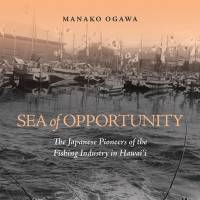The common image of Japanese immigrants toiling in the sugarcane fields of Hawaii and — through years of sheer gumption — rising in the social ranks of the island is well established. Like the account I came across some years ago of Japanese pirates looting Mekong River villages in Cambodia, the little discussed footnotes to history often make the most interesting reading.
Sea of Opportunity, by Manako Ogawa
224 pages
University of Hawaii Press, Nonfiction.
Author Manako Ogawa's focus in this new, meticulously researched publication, is primarily on the Japanese diaspora in Hawaii, but en route he provides the reader with some fascinating background detail to the history of fishing in Japan. The country's long history of fishing, the advanced skills possessed by Japanese immigrants and their experience in handling perishable foods, meant that those working in the Hawaiian fishing industry were able to oversee the entire process, from catches to processing and marketing. By the early 1920s, the author tells us, Japanese fishermen had developed the trade into the island's third largest industry after the production of sugar and pineapples. Ogawa gives us a portrait of an island deeply indebted to its Japanese and Okinawan immigrants.
Japan may not have sent forth its trading ships and naval frigates into the oceans of the world as the European colonial powers did, but through immigration programs and the tireless explorations of its fishermen in the Pacific, the character of the Japanese was affirmed not as a nation confined by its coasts, but as a maritime people.



